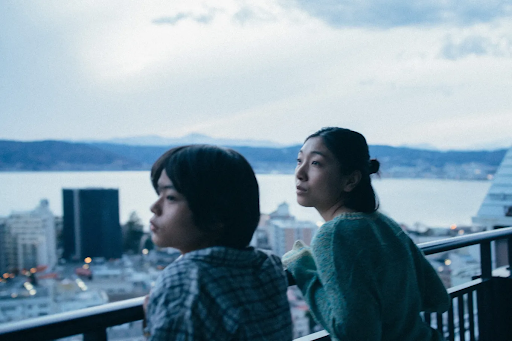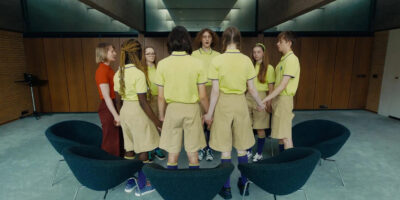Kids are fragile, mysterious creatures—they speak cryptically in riddles, they leave codes for us adults to decipher, perhaps because they don’t have the tools yet to express their feelings, especially when those feelings are scary, shameful, or overwhelming. And they often are.
“It doesn’t matter what really happened,” the elderly principal of the elementary school Fushimi (Yūko Tanaka) says to Mr. Hori (Eita Nagayama), a brand new teacher against whom abuse has been alleged by young student Minato (Soya Kurokawa); this sounds harsh, but she’s half right. The truth is often lost among the big game of telephone that we call the public eye. But we, the audience, care about what really happened, otherwise we wouldn’t be so rapt in our seats as director Hirokazu Kore-eda and screenwriter Yuji Sakamoto reveal the truth non-chronologically, and from all perspectives. The action surrounds the night of the burning of a hostess bar; Minato and his mom Saori (Sakura Andō) watch the blaze from their balcony—Minato’s father died some years previously—while Mr. Hori walks home with his girlfriend (Mitsuki Takahata). But who lit the match, and why?
Less humanist filmmakers might create straightforward he said/she said narratives and point fingers, but we know to expect better from Kore-eda by now. That is, at least when he’s making movies in his native Japan. The acclaimed director delivers; this is neither an “evil teacher vs. valiant mother” story as the local media alleges, nor is the narrative strictly “innocent teacher vs. overly protective mother,” as the school alleges. As in life, the truth is a lot more complicated than the stories told to us by journalists and administrators.

“This is all a misunderstanding,” Fushimi says to Saori during a meeting; again, she’s half right, although this falls false on Saori’s ears, and on ours too. Fushimi holds much more wisdom than she lets on, and she has the skeletons in her closet to prove it. The adults might be right in their snap judgements, considering the information provided to them: can you blame Saori for seeing Mr. Hori as a monster in a Nike tracksuit after her only kid comes home from school bloodied and visibly shaken? She’s a cool mom, but she’s still a mother, and she has a line. Is Saori supposed to sit around and do nothing? Nor can we blame Mr. Hori in his defensive action, as more pieces of the puzzle fall into place. The adults are all simultaneously right and wrong in their points of view.
Minato and his frequently bullied classmate Yori (Hiiragi Hinata) hold the key to unlocking the whole puzzle, but they’ll never tell the adults, even when they probably should. But hey, they’re kids, and they have their convoluted kid reasons. Minato apologizes out loud to no one in particular on more than one occasion, and refers to himself as a monster; he’s unable to share his feelings for his friend with his mom, and it eats him alive. Minato LADY BIRDS himself out of a car when his mom is treating him with nothing but kindness, he experiences bouts of anger out of “nowhere,” and acts cowardly when given chances to be brave. Do these things make him a monster?
One of the characters is, in fact, more monstrous than the rest—but I won’t disclose which one. The way this character is written, along with a lack of perspective from Yori, who is a lot more central to the story than Kore-eda originally lets on, renders MONSTER’s ending slightly naïve; yes, it shows us that the film is ultimately about connection and acceptance, but it also immediately undermines the very difficult scene that precedes it. Think Moonee and Jancey running toward the Magic Castle in the rushed ending of THE FLORIDA PROJECT, but one of them physically should not be able to run. I can see how some might argue the addition of more of Yori’s perspective would lead to a less focused film, but in a film that deals so closely with child abuse, it’s an essential one.














Comments